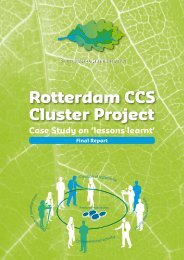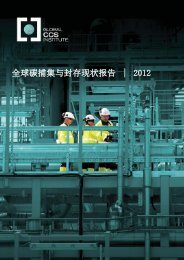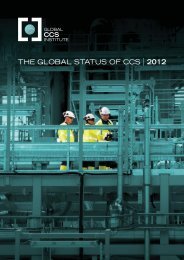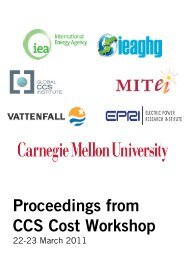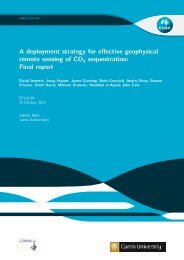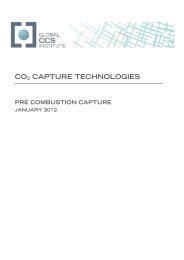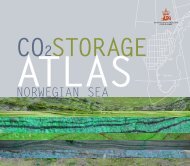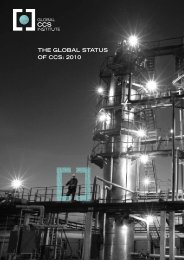Executive summaryCarbon dioxide capture and storage (<strong>CCS</strong>) presents one potential technological solution formitigating the atmospheric emission <strong>of</strong> carbon dioxide sources (G<strong>CCS</strong>I, 2011; IEA, 2009).However, <strong>CCS</strong> is a relatively new technology with associated uncertainties and perceived risks.For this reason, a growing body <strong>of</strong> research now focuses on public perceptions and potential forsocietal acceptance <strong>of</strong> <strong>CCS</strong> technology.Almost all explanations <strong>of</strong> <strong>CCS</strong> technology make reference to carbon dioxide, with an assumptionthat the general public understands CO 2 . It has become apparent that the general public’sknowledge and understanding <strong>of</strong> CO 2 ’s properties influences how they engage with CO 2 emittingindustries and <strong>CCS</strong> technologies (Wallquist, Visschers, & Siegrist, 2009). However, surprisinglylittle research has investigated public perceptions, knowledge, and understanding <strong>of</strong> CO 2 . Thisinvestigation attempts to fill that gap.This report describes an investigation <strong>of</strong> how citizens <strong>of</strong> three countries—Japan, Australia, and theNetherlands—perceive CO 2 . Furthermore, it attempts to relate individual perceptions <strong>of</strong> CO 2 toperceptions <strong>of</strong> <strong>CCS</strong>, and to determine how information provision about the underlying propertiesand characteristics <strong>of</strong> CO 2 influences individual attitudes towards low carbon energy options,particularly <strong>CCS</strong>.In brief, the research had four ultimate aims. It aimed to:• Explore the public’s knowledge and understanding 1 <strong>of</strong> the properties <strong>of</strong> CO 2 ;• Examine the influence <strong>of</strong> that knowledge on their perceptions <strong>of</strong> CO 2 and <strong>CCS</strong>;• Investigate how information provision about the underlying properties andcharacteristics <strong>of</strong> CO 2 influences individual attitudes towards <strong>CCS</strong>; and• Identify if any differences between countries exist in relation to values and beliefs,knowledge <strong>of</strong> CO 2 ’s properties, and <strong>CCS</strong> perceptions.The research employed both qualitative and quantitative methods designed to complement eachother. The qualitative component consisted <strong>of</strong> interviews and focus groups aimed at exploringpublic knowledge <strong>of</strong> CO 2 across each <strong>of</strong> the countries. They also provided an opportunity toexplore how participants reacted when provided with information about CO 2 and <strong>CCS</strong>. Using agrounded theory approach, common themes and attributes identified in the qualitative componentinformed the development <strong>of</strong> a large scale survey, which was piloted and then rolled out in eachcountry.Results from the interviews and focus groups revealed that respondents had limited knowledge <strong>of</strong>CO 2 . Although respondents were aware <strong>of</strong> the gas, and many understood basic facts about CO 2such as that plants absorb it and burning fossil fuels produces it, the majority found it difficult todescribe the specific characteristics or properties <strong>of</strong> CO 2 . Respondents from focus groups tendedto perceive CO 2 negatively as toxic and harmful. Common misperceptions shared by surveyrespondents included the belief that CO 2 had qualities similar to air pollution or soot, and that it1 The terms “knowledge” and “understanding” are for the most part used interchangeably throughout this report.vi | Understanding how individuals perceive carbon dioxide
was flammable or explosive. Substantial uncertainty existed over whether CO 2 affects humans inthe same way as carbon monoxide. Few respondents could describe uses for CO 2 . Likewise, manyresearch participants had misperceptions regarding the mechanism <strong>of</strong> climate change: theseparticipants believed that CO 2 emissions caused ozone depletion, thereby leading to climatechange. This confirms the results <strong>of</strong> earlier research in Australia, conducted during October 2010,in which 59% <strong>of</strong> Australian respondents believed that “the hole in the ozone layer contributes toclimate change” (Ashworth, Jeanneret, Gardner, & Shaw, 2011).Awareness <strong>of</strong> <strong>CCS</strong> was generally low, with greater awareness among residents <strong>of</strong> the Netherlandsthan <strong>of</strong> Japan or Australia. This may relate to substantial media attention to the Barendrecht <strong>CCS</strong>project between 2008 and 2010 (Feenstra et al., 2010). <strong>Perceptions</strong> <strong>of</strong> <strong>CCS</strong> also varied betweeneach country. After the presentation <strong>of</strong> basic information on the technology during interviews andfocus groups, Japanese respondents tended to regard <strong>CCS</strong> favourably, whereas the majority inAustralia regarded <strong>CCS</strong> negatively, while perceptions were mixed in the Netherlands. Overall,respondents from the focus groups and interviews did not tend to support implementing <strong>CCS</strong> neartheir homes. Survey respondents were generally more favourable to <strong>of</strong>fshore rather than onshorestorage while the differences in extent <strong>of</strong> opposition between onshore and <strong>of</strong>fshore vary amongthree countries (in Japan it was smallest 2 ). More broadly, participants from all three countriestended to agree that to a certain extent, society should accept some risks in relation to newtechnologies; and also tended to be averse to paying additional tax to address climate change.The information about CO 2 provided in the interviews, focus groups, and surveys promoted greaterunderstanding and to a certain extent dispelled previous misperceptions held by somerespondents, but it did not dramatically change perceptions and opinions on <strong>CCS</strong>. Importantly,survey results showed that information on natural phenomena involving CO 2 3 , and on CO 2 ’sbehaviour in <strong>CCS</strong>, had a weak but significant negative effect on <strong>CCS</strong> perceptions, whereasinformation on CO 2 ’s properties and chemistry had a positive effect. Furthermore, interviewparticipants considered descriptions <strong>of</strong> CO 2 ’s behaviour in <strong>CCS</strong> and its natural patterns <strong>of</strong>occurrence to be important, even though such information did not dramatically change theirperceptions and opinions. Almost all misperceptions about CO 2 correlated with misperceptionsabout <strong>CCS</strong>.These findings highlight the importance <strong>of</strong> providing basic and wide-ranging information on CO 2 aspart <strong>of</strong> <strong>CCS</strong> communications. In addition, the variety <strong>of</strong> respondent reactions signals the value <strong>of</strong>addressing this variation in beliefs throughout future communication efforts.One interesting result from this research was the strong relationship between participants’tendency to believe in the credibility <strong>of</strong> certain information and communication sources and theirknowledge <strong>of</strong> <strong>CCS</strong> topics. Trust in national NGOs, local NGOs, friends, and the internet—asopposed to public sector organisations, local government, national newspapers, and scientists—was negatively correlated with correct understanding <strong>of</strong> <strong>CCS</strong>. This has serious implications for<strong>CCS</strong> communications, as it suggests that the same members <strong>of</strong> the public who are less likely totrust public sector and scientific sources may also be the people with the poorest understanding <strong>of</strong><strong>CCS</strong>.2 In the previous study in Japan, there was a similar result about support for <strong>of</strong>fshore /onshore in a questionnaire survey (MizuhoInformation & Research <strong>Institute</strong> 2010). In the same study, it was found that respondents raised spatial contiguity as the main reason forthe support <strong>of</strong> <strong>of</strong>fshore storage over onshore storage in focus groups (Mizuho Information & Research <strong>Institute</strong> 2010). We wouldinterpret it would be one <strong>of</strong> the reasons for the small difference in support between <strong>of</strong>fshore and onshore that a large part <strong>of</strong> Japanesepopulation resided sea coast areas.3 “Natural phenomena involving CO 2 “originally means analogical phenomena <strong>of</strong> <strong>CCS</strong> involving <strong>CO2</strong> The information sheets includes,natural ‘<strong>CO2</strong> leakage events’, natural or accidental human exposure to higher concentration <strong>CO2</strong> and natural <strong>CO2</strong> reservoir.Understanding how individuals perceive carbon dioxide | vii




